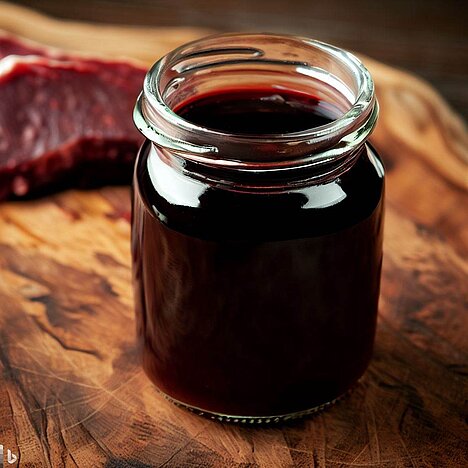Wild blood

Wild blood is a nutritional supplement for dogs that is obtained from the blood of wild animals such as deer, roe deer or wild boar. It is intended to promote the health and vitality of dogs by providing them with important nutrients such as iron, protein, minerals and vitamins. Wild blood is usually offered in liquid or powder form and can be added to normal food.
What are the benefits of Wild Blood for dogs?
Wild blood has a number of benefits for dogs due to its natural and species-appropriate composition. These include:
- Boosting the immune system: wild blood contains many antioxidants that can strengthen dogs' defenses and protect them from disease.
- Improving blood formation: Wild blood is rich in iron, which is important for the formation of red blood cells. An iron deficiency can lead to anemia and weakness, which can be compensated for with wild blood.
- Muscle support: Wild blood provides high-quality protein, which is essential for building and maintaining muscles. Active or sporty dogs in particular benefit from an additional source of protein.
- Promotes digestion: Wild blood contains various enzymes that can improve digestion in dogs and increase nutrient absorption. It can also help with diarrhea or constipation by regulating the intestines.
- Stimulating the appetite: Wild blood has an intense flavor that can stimulate a dog's appetite. This is particularly beneficial for fussy or sick dogs that would otherwise eat too little.
What are the disadvantages of wild blood for dogs?
Wild blood also has some disadvantages for dogs that should be considered before feeding it. These include:
- Risk of pathogens: wild blood can be contaminated with various bacteria, viruses or parasites that can be dangerous for dogs. This applies in particular to raw game blood that has not been heated or pasteurized. To minimize the risk, you should only buy game blood from reputable producers and pay attention to the expiry date.
- Overdose of nutrients: Wild blood is very rich in nutrients and should therefore only be fed in moderation. An overdose of iron, protein or vitamins can lead to symptoms of poisoning or metabolic disorders. To avoid this, you should stick to the recommended dosage and check your dog's health regularly.
- Intolerance or allergy: Wild blood can trigger intolerances or allergies in some dogs, which can manifest themselves in symptoms such as vomiting, diarrhea, itching or skin rashes. This may be due to an individual sensitivity or a cross-reaction with other allergens. To avoid this, wild blood should only be introduced slowly and attention should be paid to possible reactions.
Wild blood is a nutritional supplement for dogs that is made from the blood of wild animals. It has some benefits for the health and vitality of dogs, but also some disadvantages that should be considered. Wild blood should therefore only be fed in appropriate quantities and under observation.
If you notice any signs of hypersensitivity or poisoning in your dog, you should see your vet immediately. We are not a substitute for a vet, but we try to be as accurate as possible. Every dog reacts differently and we recommend you get a second opinion or consult your vet if in doubt.
Stay healthy and take good care of your four-legged friend!😊